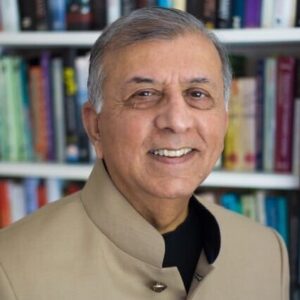Pakistan’s Triple Crisis: What’s Behind the Economic, Political, and Security Turmoil
Virtual Member-Only Briefing
Monday, April 24 , 2023 | 6:00 PM – 7:15 PM ET
Pakistan is currently experiencing its worst economic crisis, exacerbated by political paralysis, devastating floods, rising inflation, and the resurgence of terrorism. The country is dealing with three intersecting crises: an economic crisis, a political crisis, and a security crisis that has grown since the fall of Kabul. How can Pakistan address the multi-faceted and interlocking challenges that the country faces, including climate change, unemployment, a weakening education system, political polarization, and severe internal conflicts? And what steps should international institutions take to promote stability in this nuclear-armed state? Join us on Monday, April 24th, 2023 at 6:00 PM EST for a virtual member-only discussion with Mr. Shuja Nawaz, a political and strategic analyst and the first director of the South Asia Center at the Atlantic Council, to address Pakistan’s economic-socio-political challenges and consequences, the influence of its neighbors, and how all these forces are impacting Pakistan’s trajectory.
*This event is exclusive for Network 20/20’s members and donors
THIS SESSION IS FREE FOR NETWORK 20/20’s MEMBERS
NOT YET A NETWORK 20/20 MEMBER?
Apply today to enjoy all exclusive briefings with high-profile speakers
SUGGESTED READING:
“The unfinished efforts against terrorism and militancy in Pakistan”, Shuja Nawaz and other experts, Atlantic Council
“Pakistan on the brink of economic collapse”, Shuja Nawaz, Asia Times, April 6, 2023
Shuja Nawaz
 Shuja Nawaz, a native of Pakistan, was made the first director of the South Asia Center at the Atlantic Council in January 2009. He is currently a distinguished fellow at the Center.
Shuja Nawaz, a native of Pakistan, was made the first director of the South Asia Center at the Atlantic Council in January 2009. He is currently a distinguished fellow at the Center.
A political and strategic analyst, Mr. Nawaz writes for leading newspapers and websites and speaks on current topics before civic groups, at think tanks, and on radio and television worldwide. He has worked with RAND, the United States Institute of Peace, the Center for Strategic and International Studies, and other leading think tanks on projects dealing with Pakistan and the Middle East. He has also advised or briefed senior government and military officials and parliamentarians in the US, Europe, and Pakistan.
Mr. Nawaz was educated at Gordon College, Rawalpindi, where he obtained a BA in economics and English Literature and the Graduate School of Journalism of Columbia University in New York. He was a newscaster and news and current affairs producer for Pakistan Television from 1967 to 1972 and covered the western front of the 1971 war between Pakistan and India. He has worked for the New York Times, the World Health Organization, and has headed three separate divisions at the International Monetary Fund. He was also a director at the International Atomic Energy Agency in Vienna 1999-2001, while on leave from the IMF. Mr. Nawaz was the managing editor and then editor of Finance & Development, the multilingual quarterly of the IMF and the World Bank. He served on the editorial advisory board of the World Bank Research Observer.
He is the author of a new book The Battle for Pakistan: The Bitter US Friendship and a Tough Neighbourhood (Penguin Random House, 2019 and Rowman & Littlefield 2020), and Crossed Swords: Pakistan, its Army, and the Wars Within (Oxford University Press 2008 and 2017). He is also the principal author of FATA: A Most Dangerous Place (CSIS, Washington DC January 2009), Pakistan in the Danger Zone: A Tenuous US-Pakistan Relationship (Atlantic Council 2010), Learning by Doing: The Pakistan Army’s Experience with Counterinsurgency (Atlantic Council 2011), and with Mohan Guruswamy India and Pakistan: The Opportunity Cost of Conflict with a foreword by former Secretary George Shultz (Atlantic Council 2014).
THIS SESSION IS FREE FOR NETWORK 20/20’s MEMBERS
Photo credit: Creator: Rahmat Gul | Credit: AP
We are trying our best to keep our community informed about foreign affairs, and we would appreciate if you can support us to keep this virtual briefing series going. No amount is too small.

